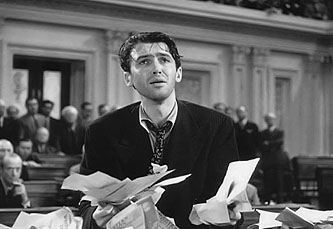 Senate reformers have been talking lately about new filibuster rules that would require minority senators to keep talking during the entire length of their filibuster. No more nonsense about just announcing a filibuster and then heading out for drinks. Gregory Koger points out a problem with this:
Senate reformers have been talking lately about new filibuster rules that would require minority senators to keep talking during the entire length of their filibuster. No more nonsense about just announcing a filibuster and then heading out for drinks. Gregory Koger points out a problem with this:
A determined majority could outlast a single obstructionist, or a few senators, but an organized succession of twenty or so senators could occupy the floor one at a time, each demanding the presence of a majority of the Senate. In order to restore attrition filibusters, the Senate needs to balance the rules of the game so that only one pro-bill senator is required to stay in the chamber while an anti-bill senator filibusters.
Right. As long as the minority can tag team, while retaining the right to roust majority senators out of bed at any time by demanding a quorum call, the cost of a filibuster is far smaller for the minority than the majority. But what if we changed just this single aspect of things?
Here’s an idea. Senate Rule XXII, which controls the filibuster, originally required two-thirds of all senators present and voting to break a filibuster. In 1975 this was changed to three-fifths of all senators duly chosen and sworn. But what if we went back to the present and voting standard?
In that case, the majority would still have to hang around, so there’s a cost to trying to break a filibuster. But the minority has to hang around too. At any point, if too many minority senators have gone home or skipped town, the majority can call a vote and break the filibuster as long as they have three-fifths of all the senators currently on the floor.
Obviously this would require several other rule changes to be effective. And maybe it’s not possible to create a set of rules that would effectively make this work. What’s more, I think it’s a dumb idea anyway. Should the Senate really be run on the basis of which side can muster up the most physical stamina?
Still, if this is the direction that reformers want to go, it’s worth a thought. I’d be interested in hearing from some Senate rules guru why it couldn’t work.

















